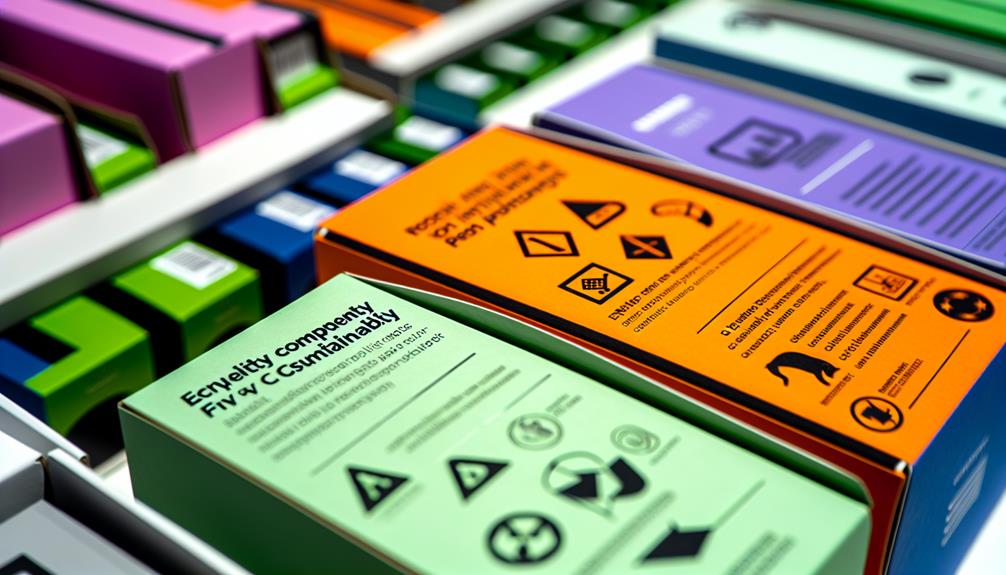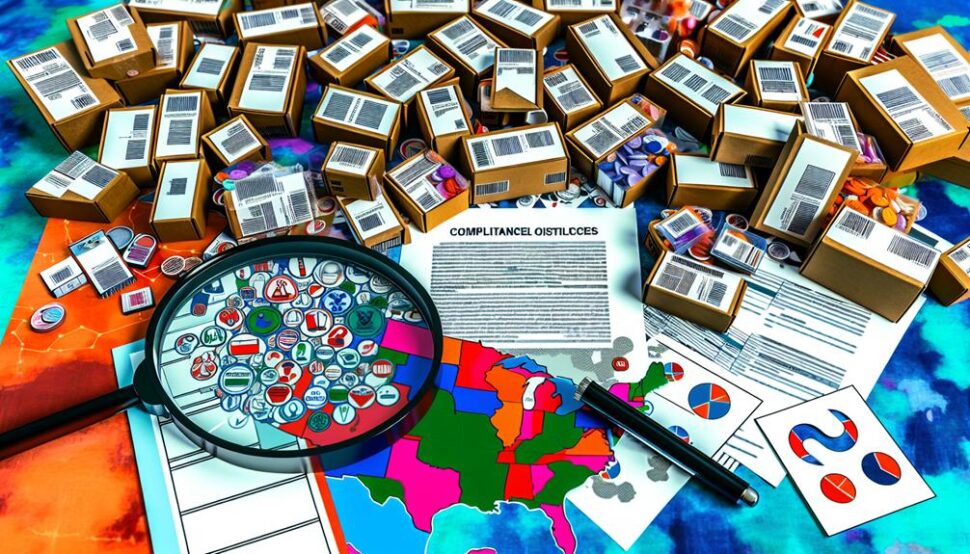
Understanding retail packaging compliance is vital for your business. It guarantees consumer safety and protects your brand’s integrity. You need to comply with various regulations, like the Fair Packaging and Labeling Act, which mandates accurate labeling. Managing these laws can be challenging, especially with state-specific requirements. Staying updated on emerging sustainability laws is important, as mandates like California’s Rigid Plastic Packaging Container Law push for eco-friendly materials. Adopting best practices, like regular audits and accurate labeling, can help you stay compliant and build consumer trust. There’s plenty more to cover, so you might find additional insights beneficial.
Main Points
- Retail packaging compliance ensures consumer safety by using non-toxic materials to prevent contamination and protect health.
- Familiarize yourself with key regulations like the Fair Packaging and Labeling Act and state-specific laws for accurate labeling.
- Adopt sustainable practices by utilizing eco-friendly materials and adhering to laws promoting recycled content in packaging.
- Regular audits and proactive monitoring can help identify compliance gaps early and maintain adherence to evolving regulations.
- Collaborating with retail partners enhances compliance alignment and operational efficiency across the supply chain.
Importance of Packaging Compliance

Packaging compliance is essential for safeguarding consumer safety and maintaining product integrity. Adhering to packaging regulations guarantees that food and other products remain uncontaminated, using non-toxic materials that protect consumer health.
Moreover, utilizing eco-friendly materials like recycled cardboard can enhance your sustainability efforts, aligning with growing demand for sustainable packaging solutions. Compliance with labeling requirements, including clear manufacturer contact details, prevents deceptive packaging practices that mislead customers.
In addition, sustainable packaging fosters environmental responsibility, promoting recycling and reducing waste. By following these regulations, you enhance your brand’s reputation, building consumer trust that can influence purchasing decisions positively.
Non-compliance, on the other hand, risks significant financial penalties and legal liabilities, which can restrict market access. Ultimately, proper packaging compliance not only guarantees product integrity throughout the supply chain but also demonstrates a commitment to quality and safety that consumers value.
Key Legislation and Regulations
Understanding the regulatory landscape is vital for businesses aiming to maintain compliance in their packaging practices. You need to familiarize yourself with key packaging regulations like the Fair Packaging and Labeling Act, which guarantees accurate product identity and labeling.
Extended Producer Responsibility (EPR) mandates reporting of packaging volumes, with variations by state and country. In California, the Rigid Plastic Packaging Container Law requires a minimum of 25% recycled materials in rigid containers.
Furthermore, the Model Toxics in Packaging Legislation limits heavy metals in packaging to 100 ppm. To avoid deceptive packaging and labeling, rely on the FTC Green Guides for accurate environmental claims.
Confirm your products comply to enhance trust and marketability.
Compliance Challenges in the U.S

Steering through compliance challenges in the U.S. can feel overwhelming, especially with the multitude of regulations impacting packaging practices.
You’ll need to navigate the Fair Packaging and Labeling Act (FPLA) for standardized labeling and adhere to FDA Food Labeling requirements. The Poison Prevention Packaging Act demands child-resistant packaging for hazardous products, complicating your packaging processes.
Furthermore, state-specific regulations, like California’s Rigid Plastic Packaging Container Law, require a minimum of 25% recycled materials. The Federal Trade Commission enforces guidelines to prevent misleading environmental claims, so your sustainable practices must be accurately represented.
Sustainability and Emerging Laws
As compliance challenges in the U.S. evolve, sustainability is becoming a key focus for brands maneuvering the regulatory landscape. Emerging legislation, like the California Rigid Plastic Packaging Container Law, mandates that rigid plastic containers contain at least 25% recycled materials or be reusable. This highlights the urgent need for sustainable packaging practices, such as using eco-friendly materials like Kraft paper.
Moreover, the Model Toxics in Packaging Legislation restricts heavy metals in packaging to a maximum of 100 ppm, requiring compliance certificates from manufacturers. Proposed regulations such as the Digital Product Passport aim to enhance transparency by centralizing product information, making it easier to meet sustainability laws.
In addition, the EU Green Claims Directive stresses that brands must substantiate their environmental claims to guarantee packaging compliance and prevent misleading representations.
Best Practices for Compliance

Effective compliance in retail packaging hinges on adopting best practices that not only meet regulatory requirements but also build consumer trust.
Start with accurate labeling; it’s essential for ensuring consumers receive reliable information, preventing potential legal issues. In the context of vape accessories, packaging importance can’t be overstated, as it protects products and enhances brand visibility.
Implement proactive monitoring and regular audits of your packaging practices to identify compliance gaps early, reducing the risk of penalties and recalls.
Foster collaboration with your retail partners to align compliance goals and enhance operational efficiency through shared understanding.
Utilize data-driven decision-making to stay ahead of regulatory changes that impact packaging, especially regarding evolving sustainability and safety standards.

